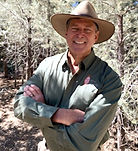When the SHTF
- Gary Albyn
- Jul 14, 2024
- 3 min read
An excerpt from my latest book, DO IT LIKE DAX—Building a Bug-Out-Bag, available worldwide on Amazon.

We take for granted the array of conveniences that are available to us on any given day. Whether it be a household cabinet full of medical supplies or a sophisticated trauma unit at our local hospital, we seldom give thought to how we’d cope without them. But in a SHTF situation, that’s exactly what we’ll be facing. Being adequately prepared is certainly a step in the right direction. However, there’s no substitute for hands-on, practical First Aid training. It’s a valuable life skill. Allow me to elaborate.
Timm Smith is an extraordinary man. Instead of settling for a lucrative career as an advocate in the early 90s, he opted for a position with the Executive Protection Team of the South African Police Force. After several years guarding foreign and local dignitaries—including the late President Mandela—Smith ventured into the private sector where he opened the now-acclaimed Ronin Protective Services in Cape Town. Rather than succumbing to the temptation to squeeze-out as many future bodyguards as possible, he set his academy on a different course, choosing instead an image of excellence over volume. It wasn’t long before Ronin SA was drawing top candidates from around the globe. With classes never exceeding 16 hopefuls, the program is both intensive and challenging: and the drop-out rate bears testament to the high standards he sets for his students. But Smith’s own path to excellence wasn’t without challenge. In 1993, while protecting the Prime Minister of Portugal, an unexpected incident forced him to reset his own compass. Suddenly, one of the dignitaries clutched his chest and collapsed to the floor. Unsure as to what to do next, the bewildered group turned expectantly toward the bodyguard. After all, he was there to protect them, right? After calling the paramedics, Smith attempted to reassure the patient by loosening his tie and making him comfortable. However well-intentioned, he knew his interventions were totally ineffectual. It was in that moment that Smith sensed the true meaning of the word ‘bodyguard.’ If you can protect your client from the outward threat, but not from the silent threat within, are you truly worthy of the title bodyguard? With characteristic determination, Smith set about filling the gap in his already impressive repertoire of skills. Within three years he’d qualified as an Advanced Paramedic. In fact, Smith places so much emphasis on paramedical skills that a full week of his bodyguard course is devoted to CPR, spinal immobilization, asthma interventions, splinting, establishing airways, suturing, chest decompressions, and plenty more beside. As Smith’s senior instructor between 2011 and 2013, I had the honor of training almost 400 dedicated bodyguards, several of whom I later worked with in a professional environment. From conversations with them—and others beside—I am aware of numerous medical emergencies where their timely interventions helped save lives.And my point is this: their ability to assess, decide and implement appropriate life-saving interventions can be attributed to the training they received during that one-week period. At the very least, get yourself trained in basic first aid: remember, it's not for you; it's for the life you save.
Ronin SA's training facilities extend well beyond its campus on the outskirts of Cape Town. Each of its courses include practical training and drills in the streets and suburbs of the Cape peninsula, and include live ambulance duties. But the academy doesn't only train aspirant bodyguards and paramedics. Aimed at the layman, the ever-popular Self Reliance Course teaches individuals a host of valuable life skills.
Visit www.ronin.co.za





Comments